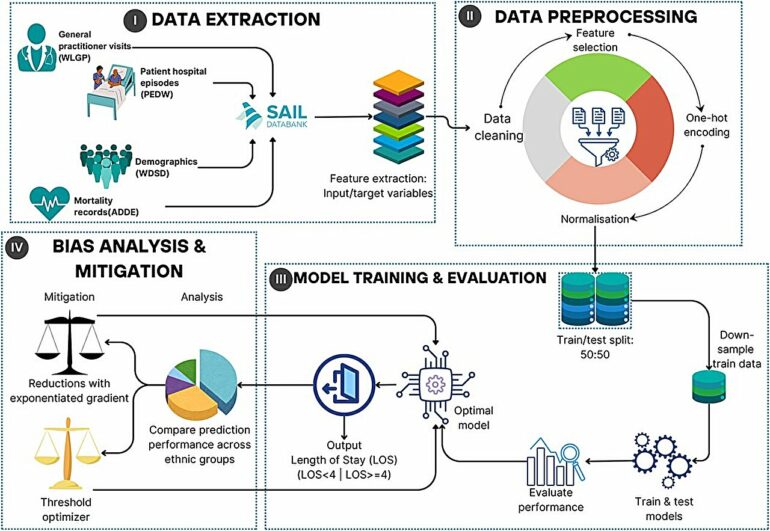A new artificial intelligence (AI) model has been developed to predict how long a person with a learning disability is likely to stay in hospital, offering valuable insights that could improve care and resource planning.
Developed by computer scientists at Loughborough University as part of the DECODE project, the model aims to tackle health care challenges faced by people with learning disabilities and multiple health conditions. The research is published in the journal Frontiers in Digital Health.
This group has a life expectancy 20 years lower than the UK average, often due to poorer physical and mental health and a higher likelihood of having multiple chronic illnesses. These factors increase the risk of preventable complications, reduced quality of life, and prolonged hospital stays.
How the AI model works
The Loughborough University researchers used GP and hospital data from over 9,600 patients with learning disabilities and multiple health conditions to develop an AI model capable of predicting hospital stay lengths within the first 24 hours of admission.
“The model generates predictions by assessing factors such as a patient’s age, medication history, lifestyle, and existing health conditions,” explains Professor Georgina Cosma, an expert in AI for health care at Loughborough University and DECODE co-investigator.
“With early and accurate predictions, hospitals can plan better and provide more personalized care, ensuring fair treatment for all patients.”
The AI model was tested using the dataset it was trained on and was 76% effective in distinguishing between patients likely to have prolonged hospital stays and those who would be discharged sooner.
Hospitalization trends
The AI model was also used to analyze the hospital data to identify key reasons for hospitalizations and health patterns among people with learning disabilities and multiple health conditions.
It found:
Cancer is the leading cause of hospital admissions for men and women with learning disabilities and multiple health conditions, but other top reasons differ by gender
Epilepsy is the most frequently treated condition during hospital stays for both men and women, but other top reasons differ by gender
On average, people with learning disabilities and multiple health conditions stay in hospital for three days and stays exceeding 129 days are often linked to mental illness
Patients with stays of four or more days are more likely to:
Be over 50 years old
Live in more deprived areas
Have obesity or are less physically active
Have more health conditions, a history of long hospital stays, or previous treatment for long-term conditions.
Importance of the research
Jon Sparkes OBE, CEO of learning disability charity Mencap, has welcomed the findings.
He said, “This research demonstrates how AI could help tackle these vast inequalities by spotting patterns and predicting resource needs, which could all improve patient outcomes.

The top five primary conditions and top five common conditions treated or investigated during hospitalizations for (a) males and (b) females with learning disabilities and multiple long-term conditions. © Loughborough University
“However, prediction alone is not enough—we must ensure these insights drive real-world changes, reducing avoidable hospital admissions and ensuring people with learning disabilities receive timely, effective, and personalized support.
“As the Government develops the 10 Year NHS Plan, they must prioritize using technology to address health inequalities and ensure the health care system meets the needs of people with a learning disability.”
Next steps
The insights from this study and the wider DECODE project will be used to support the NHS in developing risk prediction algorithms to assist clinicians in decision-making.
Dr. Satheesh Gangadharan, Consultant Psychiatrist with the Leicestershire Partnership NHS Trust and the DECODE Co-Principal Investigator, said, “We are in the process of applying this knowledge into practice as well as sharing it widely.
“While hospital care is an important part of health care provision, we are exploring ways to minimize the need for hospitalization by exploring where health interventions could be delivered earlier and people with learning disabilities could be engaged in their care better.”
The data used to train the AI model came from GPs and hospitals in Wales. As part of their next steps, the researchers are applying the model to datasets from hospitals in England to assess whether similar patterns emerge across different populations.
Professor Thomas Jun, an expert in sociotechnical system design at Loughborough University and DECODE Co-Principal Investigator, said, “We’re now expanding our study to include a more diverse group of over 20,000 patients across England to ensure our predictive model is as accurate and effective as possible.
“We’re also seeking additional funding for a clinical trial to test how this personalized prediction tool can reduce emergency admissions and improve quality of life for patients with learning disabilities and multiple long-term conditions.”
More information:
Emeka Abakasanga et al, Equitable hospital length of stay prediction for patients with learning disabilities and multiple long-term conditions using machine learning, Frontiers in Digital Health (2025). DOI: 10.3389/fdgth.2025.1538793
Provided by
Loughborough University
Citation:
AI model predicts hospital stay lengths for people with learning disabilities (2025, February 25)



